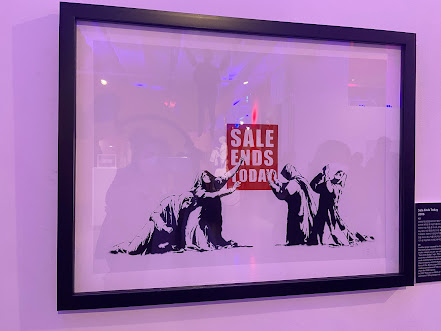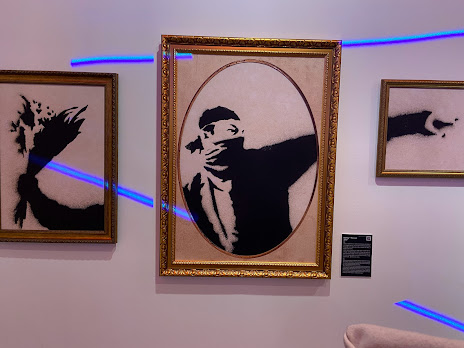K-dramaland Nostalgia
 |
| With (a cardboard cutout of) the male lead of Boys Over Flowers in 2016. |
Even in Korea—
Watching the cherry blossoms bloom—
I long for Korea.*
I've lived in Korea almost 4 years, yet I often find myself wishing I lived in Korea. This being the Korea I envisioned 8 years ago when I was first introduced to the country's pop culture. My then steady diet of K-drama, K-pop, and variety shows, the most accessible entertainment options for overseas audiences, shaped my vision of Korea into a fun, romantic, and sexy country. "Korea feels like Hogwarts, a fantasy land," I'd told my friends. I knew the country was much more than that in principal, but I couldn't remove the emerald glasses I'd donned.
Sometimes me and other K-culture fans would whisper about the 'dark side of Korea.' "The school system is so intense! Did you know they all wake up at 5 and sleep at midnight?" "K-pop stars are hardly allowed to eat! And they compete so much in looks that they have to get plastic surgery!" These two arguments are straight from the 'dark side of Korea' starter pack. Unfortunately, such conversations only added to the intrigue.
 |
| Visiting Korean broadcaster, KBS, during my semester as an exchange student in 2016. |
This collection of cliques, however, shouldn't be synonymous with Korea, just as Friends and Grey's Anatomy aren't perfect representations of the US. Rather, Korea's onscreen world should be considered, K-dramaland.**
K-dramaland might not really reflect reality, but I was happy when I lived there. The more I learn about Korea the harder it becomes to separate shows from modern issues and I can miss the feeling of being swept off my feet in fantasy.
*The poem is a variation of, "Even in Kyoto— / Hearing the cuckoo's cry— / I long for Kyoto," by the Japanese poet, Basho.
**I first saw the term, K-dramaland, in a book chapter by Jennifer Rachel Dutch, "Consuming K-Drama Cuisine: The Intersection of Fans, Fandom and Food in the Search for a Real Korean Meal."
Listening
1. Crying NutI took two classes in graduate school on Korean pop culture's rise to overseas prominence. Most of the course readings focused on non-Korean consumers of Kpop, which were interesting enough considering they related to my own experience, but I found the articles on Korean music's history the most attractive. This was especially true for an ethnographic article on Korea's punk-rock scene (Anarchy in the UK, Solidarity in the ROK: Punk Rock Comes to Korea, by Stephen Epstein). The article showcased research I longed to undertake–that of observing, participating, and storytelling, no matter my professors' preference for quantitative data. Epstein's 2000 article highlighted the burgeoning Korean punk scene as Epstein saw it develop at Club Drug in Hongdae, with a special mention for one of the scene's leading bands, Crying Nut.
Punk was imported from the UK, and provided a new avenue for young Koreans to express themselves. The elements typical of UK punk culture such as safety pin accessories and spiked hair found their way to the Korean peninsula. However, Epstein points out these elements were more akin to costumes than indications of new lifestyles. When punk came to Korea it adapted to a milder, temporary form that still expressed frustrations in line with punk ethos, but allowed individuals to remain fixed in civilian life. Audiences wore clothes with the odd dangling object, or at the least non-corporate wear to show they belonged in a club setting, but after a night of screaming to lyrics that condemned societal rules and expectations, they put these duds aside and returned to white-collar jobs and family life. Punk was a balm for societal issues, rather than an alternative.
 |
| A piece by the street artist, Banksy. One of the grandmothers knits a sweater that reads, "PUNKS NOT DEAD." |
Bands like Crying Nut allowed young people to explore their unconventional sides, and still do so even 25 years after debut. They frequently host live streams and upload new performances on their YouTube account, perform at music festivals around the world, and have been featured in dramas such as DP, Clean with Passion for Now, and Hospital Playlist. Their early track, Speed Up Losers, even became Team Korea's official anthem for the 2002 World Cup, shooting them to stardom.
Below, the music video for Speed Up Losers (말달리자).
As for me, I see Crying Nut as the punk rockers of 2000 did–unconventional, funny, and a balm for the world's woes. I bob my head to Speed Up Losers not in Club Drug but in my small apartment, and I play with the idea of becoming a rogue artist only to get back to the daily grind the next morning. My lifestyle is certainly nowhere near punk, but through Crying Nut's music I allow myself to explore that side of myself, and the world feels a bit less heavy when I head out the next morning.
Below, Pigeon (비둘기) is one of the band's more outlandish songs.
2. Merry-Go-Round by Sokodomo, Zion T, and WonsteinThe rapper Sokodomo, R&B artist Zion T, and Wonstein first performed Merry-Go-Round last November, and it instantly rocketed to #1 on Korea's music charts. The song seems to have gained popularity not only for it's relatable lyrics about the repetitiveness of life, but for the energetic dancers and fun staging on the hip-hop show, Show Me the Money, featured below.
Reading
No One Writes Back by Jang Eun-Jin, translated by Jung Yewon, and The Story of Hong Gil DongA long-term wanderer writes letters to numerically-designated strangers; he also writes his name on the underside of bathroom sinks in every motel he visits, and sometimes he pretends he's blind to make sure his dog can come on the subway. He's a wanderer, and pledges to only return home once one of the hundreds of strangers he's met on the road writes him back. For three years no one has.
An author on a mission to sell a cart full of books inserts herself in the wanderer's story. Together they get used to being with another human, discuss life on the road, and slowly reveal their reasons for choosing nomadic life.
No One Writes Back is interesting enough, but I finished this novel again feeling protagonists in modern Korean literature passively observe happenings rather than make things happen. The wanderer doesn't do much except walk without a destination and write letters. In contrast, the side characters he meets come with their own delicious weirdness, another trend in translated Korean literature.
 |
| Korean Cover of No One Writes Back (Image via Goodreads) |
It's especially interesting when I compare No One Writes Back with traditional tales like The Story of Hong Gil Dong. This famous story emerged during the Joseon Dynasty (1392-1897 CE) and pervades Korean culture to the point Hong's name became synonymous with 'John Doe.' In the story Hong goes around stealing from the rich, chasing his dream of becoming Minister of War, performing amazing magical feats, boldly suggesting himself unsolicited leader of a bandit group he just met, and eventually using that group to conquer an island and create his own country. For such a short book (the version published by Penguin Classics in 2016 only has 100 pages), Hong proves he has more gumption in his little finger than every other character combined.
The wanderer in No One Writes Back is certainly more in line with real life than Hong Gil Dong. Going out and making your own country is harder than it sounds (or just as hard as it sounds), but even so the letter writer had no goal except meandering the peninsula talking to strangers until someone returned his letter. This isn't so much a critique as me noticing a trend. Admittedly, I prefer the comically active characters of early stories. Life is heavy and I often feel constrained by my circumstances, so it's refreshing to read about self-assured and dynamic characters. Hong Gil Dong makes me want to get up and conquer the world.
Maybe a trend where main characters observe more than act suggests modern Korean life is not one to facilitate great deeds. Perhaps we must move lethargically within the system because that's the only movement available. Perhaps this is me reading into something I should just leave alone.
Doing
- Listening to a podcast about new books in anthropology
- Looking for a job
- Cleaning my apartment constantly
- Going through a short quarantine in a an airport facility after arriving in South Korea
 |
| My quarantine room! The TV didn't work and there wasn't any wifi, so I opened a Christmas gift from my dad and read while I waited for my result. |
- Meeting cute friends at cute cafes
- Getting involved in a new church
- Eating too many choco pies
- Listening to these new in Korean indie and hip-hop playlists
- Seeing my brother get married in Dubai!
Seeing
Banksy
Below are some of my favorite pieces from the Banksy exhibition at the Seouliteum.
 |
| This work's caption partially reads, "In the work of Christ with Shopping Bags, Christ is being crucified, and the pain is not lessened by the weight of his shopping bags." |
 |
| Another religiously provocative image showing women praying to a SALE sign. |
 |
| Banksy Thrower. Instead of tear gas this rioter throws flowers to represent both the futility of fighting against powerful oppressors and the desire for peace. |
 |
| Part of the exhibition, "Triple Rings: Replicas from Yesterday, Tomorrow," at Culture Station Seoul, 284. |
 |
| "Briefly Gorgeous" Exhibit at Gallery Hyundai. |
끝까지 함께 해 주셔서 고맙습니다. 다음에 또 만나요!
(Thanks for reading to the end. Let's meet again next time!)








Comments
Post a Comment